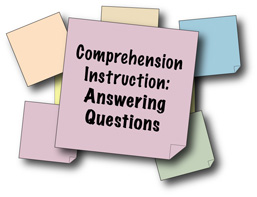What should content-area teachers know about comprehension instruction?
Page 12: Answering Questions
 Teachers routinely assign the questions at the end of a chapter to determine whether students have comprehended that chapter’s content. Although students might be able to answer questions whose answers are explicitly stated in the text, they might have more difficulty answering those that require them to make inferences or draw upon different sources of information. Therefore, it can be helpful for students to learn about four basic types of question-answer relationships (QARs). These four basic types are outlined in the table below.
Teachers routinely assign the questions at the end of a chapter to determine whether students have comprehended that chapter’s content. Although students might be able to answer questions whose answers are explicitly stated in the text, they might have more difficulty answering those that require them to make inferences or draw upon different sources of information. Therefore, it can be helpful for students to learn about four basic types of question-answer relationships (QARs). These four basic types are outlined in the table below.
 |
Right ThereThe answer is in the text and is usually easy to find. Students can find the answer in one place. In what year…
Who invented... |
Think & SearchThe answer is in the selection, but students need to pull different pieces of information that come from different places in the text. What were some of the concerns with…
Compare and contrast… |
|
 |
Author & MeThe answer is not explicitly stated in the text. Students need to think about what they already know, what the author tells them in the text, and how it fits together. How do you think he felt when…
What do you think the author meant by … |
On My OwnThe answer is not text-based. Students must use their own experiences and background knowledge to answer the question. Have you ever…
What do you think it would feel like to… |
Embedding QAR instruction in content-area classes facilitates student learning. Students need to be directly taught how to identify and answer each type of QAR. Teachers should explain how they use the wording of a question to determine its type and the necessary components of the answer. Students need multiple opportunities to see their teachers modeling each type of QAR and to practice in different subject areas. These opportunities allow students to interact with authentic subject-matter texts that use various styles of writing.
For Your Information
Providing questions prior to reading helps improve student reading comprehension because they:
- Motivate students to read
- Alert students to topics they will be reading about
- Encourage students to be actively engaged during reading
- Prompt students to self-monitor their understanding while they read
- Help students connect what is in the text to what they already know